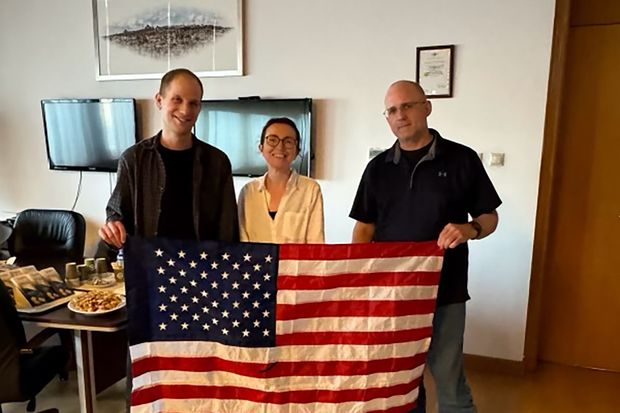In a stunning and surprising turn of events, the United States and Russia have reached an agreement to release Wall Street Journal reporter Evan Gershkovich and US Marine Paul Whelan, two Americans who have been held in Russian custody for extended periods.
This breakthrough in diplomacy has captured global attention, marking a significant moment in the often tense relationship between the two nations. The release of Gershkovich, a Wall Street Journal reporter, and Whelan, a former U.S. Marine, has brought relief to their families and sparked discussions about the future of U.S.-Russia relations.
The prisoner swap, which took place after months of behind-the-scenes negotiations, has shed light on the Biden administration’s efforts to bring Americans home. This development has implications not only for the freed individuals but also for the broader diplomatic landscape between the United States and Russia.
Details of the Prisoner Exchange
Key Figures Released
The prisoner exchange between Russia and the United States has resulted in the release of several high-profile individuals. Among those freed from Russian custody are Evan Gershkovich, a Wall Street Journal reporter, and Paul Whelan, a former U.S. Marine.
Both had been held on espionage charges, with Gershkovich detained since March 2023 and Whelan since December 2018 . Additionally, Russian-American journalist Alsu Kurmasheva and Russian dissident Vladimir Kara-Murza, a U.S. permanent resident, are also returning to the United States .
In exchange, Russia has received several of its nationals, including Vadim Krasikov, a convicted assassin who was serving a life sentence in Germany for a 2019 murder in Berlin . Other Russians released include Vladislav Klyushin, Vadim Konoshchenok, and Roman Seleznev, who were being held in U.S. prisons .
Scale of the Swap
This prisoner exchange is notable for its scale, described as one of the largest since the end of the Cold War. In total, 16 political prisoners, journalists, and others have been exchanged for eight Russians jailed in various countries. The swap involved not only the United States and Russia but also several European nations, making it a complex international operation.
Countries Involved
The exchange involved multiple countries beyond the United States and Russia. Germany played a significant role, releasing Vadim Krasikov and receiving 12 German nationals who were Russian political prisoners.
Other European countries participating in the swap include Norway, which released Mikhail Valeryevich Mikushin; Poland, which freed Pavel Alekseyevich Rubtsov; and Slovenia, which released Anna Valerevna Dultseva and Artem Viktorovich Dultsev.
The exchange took place in Ankara, Turkey, highlighting the international nature of the operation. This multi-national involvement underscores the complexity of the negotiations and the diplomatic efforts required to facilitate such a large-scale prisoner swap.
Profiles of Freed Americans: Evan Gershkovich Paul Whelan
Evan Gershkovich’s case
Evan Gershkovich, a 32-year-old Wall Street Journal reporter, was arrested in March 2023 in Yekaterinburg, Russia, while working on a story about the Wagner mercenary group . The son of Soviet Jews who emigrated to the U.S. in the 1970s, Gershkovich grew up in New Jersey speaking Russian with his parents . He became the first Western journalist arrested on espionage charges in post-Soviet Russia.
Gershkovich was detained for 571 day before his release . Despite having press credentials issued by the Russian foreign ministry, he was charged with espionage, which he vehemently denied . In July 2024, Gershkovich was sentenced to 16 years in a maximum security prison in a trial that was widely condemned as a “sham”.
Paul Whelan’s detention
Paul Whelan, a 54-year-old former U.S. Marine, had been held in Russian custody for over five years, making him the longest-held American detainee . Arrested in December 2018 while visiting Moscow for a friend’s wedding, Whelan was charged with espionage . He was sentenced to 16 years in prison in June 2020.
Whelan, who holds citizenship in four countries – the U.S., Canada, the UK, and Ireland – has consistently maintained his innocence . His family and the U.S. government have denied the espionage allegations, asserting that he was wrongfully detained . During his imprisonment, Whelan faced harsh conditions, including being punched by another inmate and having his life “slipping away” while awaiting a deal for his release.
Other notable releases
The prisoner exchange also included the release of other prominent individuals. Vladimir Kara-Murza, a 42-year-old Russian dissident and U.S. permanent resident, was freed after being imprisoned since 2022 on charges of treason and spreading false information about the military. Kara-Murza, who was awarded the Pulitzer Prize for commentary in May, had been sentenced to 25 years in prison.
Alsu Kurmasheva, a 47-year-old Russian-American journalist working for Radio Free Europe/Radio Liberty, was also released. She had been arrested in October while visiting family in Tatarstan and was charged with failing to register as a “foreign agent”. The exchange also included the release of 12 German nationals who were Russian political prisoners .
Diplomatic Efforts Behind the Scenes
The release of Evan Gershkovich and Paul Whelan was the result of extensive diplomatic efforts involving multiple countries and complex negotiations. The process, described as “a feat of diplomacy” by President Biden, showcased the importance of international cooperation in resolving sensitive issues.
U.S. Negotiation Strategy
The U.S. strategy involved persistent efforts and creative approaches to secure the release of detained Americans. Following the successful exchange of Brittney Griner in December 2022, Secretary of State Antony Blinken directed teams to make an offer for Paul Whelan, which Russia initially rejected. As negotiations progressed, U.S. officials recognized the need to broaden the deal to entice Russia, leading to the inclusion of Vadim Krasikov, a Russian held in Germany.
The Biden administration utilized various channels, including intelligence networks, to facilitate discussions. Despite initial reluctance to use intelligence channels due to concerns about lending credence to false espionage accusations against Gershkovich, negotiators ultimately determined this approach might be necessary to secure the Americans’ freedom.
Role of International Allies
International cooperation played a crucial role in the success of the prisoner exchange. Germany, in particular, was instrumental in the negotiations. Chancellor Olaf Scholz agreed to include Krasikov in the deal after discussions with President Biden and Secretary Blinken . Other European nations, including Poland, Slovenia, and Norway, also contributed by holding prisoners of interest to Russia.
Turkey played a significant role in facilitating the exchange, with the Turkish intelligence service MIT conducting what was described as “the most extensive prisoner exchange operation of recent times” in Ankara. This multinational effort underscored the importance of diplomatic alliances in resolving complex international issues.
Challenges Overcome
The negotiation process faced numerous obstacles, including initial rejections and the need to expand the scope of the deal. U.S. officials had to navigate sensitive diplomatic channels and balance the interests of multiple parties. The inclusion of Alexey Navalny in the discussions added another layer of complexity to the negotiations.
Despite these challenges, negotiators persevered, with CIA Director Burns presenting a framework for the deal to Russian counterparts in early July. The final agreement, formulated by the White House and approved by Germany, was communicated through intelligence channels, ultimately leading to a breakthrough.
Implications for U.S.-Russia Relations
The release of Evan Gershkovich and Paul Whelan has significant implications for U.S.-Russia relations, impacting diplomatic ties, future detainee negotiations, and public and political reactions. This prisoner exchange, described as one of the largest since the Cold War, has the potential to reshape the dynamics between the two nations.
Impact on diplomatic ties
The deal that secured the freedom of Gershkovich and Whelan has been hailed as a “feat of diplomacy” by U.S. President Joe Biden . The exchange involved the release of 16 people from Russia, including five Germans and seven Russian citizens who were political prisoners in their own country. This multilateral approach to negotiations demonstrates the complexity of modern diplomatic efforts and the importance of international cooperation in resolving sensitive issues.
However, the release does not necessarily signal a thaw in U.S.-Russia relations. Kremlin spokesman Dmitry Peskov’s statement hoping that “all our enemies should stay [abroad]” suggests that tensions remain high. The ongoing Russia-Ukraine war continues to strain relations between the two countries, making future negotiations challenging.
Future of detainee negotiations
The successful exchange of Gershkovich and Whelan could have significant implications for future detainee negotiations between the U.S. and Russia. The Biden administration has secured the release of more than 60 hostages or wrongful detainees from around the world over the past three years . This latest swap, involving multiple countries and complex negotiations, may serve as a template for future exchanges.
The release of Evan Gershkovich and Paul Whelan marks a significant moment in U.S.-Russia relations, showcasing the power of diplomacy in resolving complex international issues.
This prisoner swap, one of the largest since the Cold War, has an impact on diplomatic ties, future negotiations, and public perception. The multi-national effort involved in securing their freedom highlights the importance of international cooperation in addressing sensitive matters.
While this exchange brings hope for future resolutions, it also raises questions about the long-term effects on diplomatic relations and the potential for further detentions. The successful release of these Americans, along with other political prisoners, demonstrates the Biden administration’s commitment to bringing citizens home.
However, the ongoing tensions between the U.S. and Russia, particularly due to the Ukraine conflict, suggest that challenges in bilateral relations are likely to persist.




